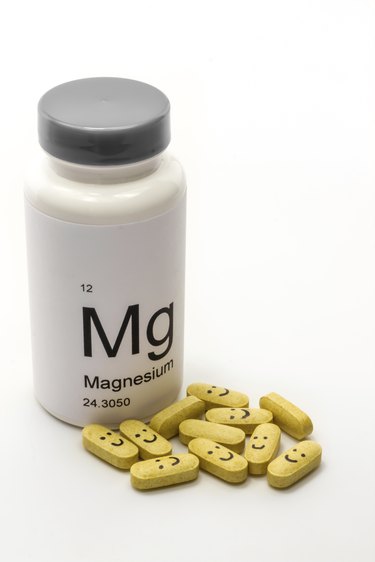
Nerve pain can be challenging to manage. The current medications used to treat conditions characterized by nerve pain often provide only partial relief. Because of this, combination therapy is sometimes recommended in the hope of providing better relief. Magnesium is emerging as a potential treatment in combination therapy. Research is still in the early stages, but magnesium is an inexpensive and readily available dietary supplement. Work with your doctor if you're considering using it for nerve pain.
Magnesium and Nerve Pain
Video of the Day
Scientists aren't completely sure how magnesium helps alleviate nerve pain. It may have something to do with magnesium's potential influence on inflammation, however. Experimental evidence in animals found that magnesium regulates processes involved in the inflammatory response. When cellular magnesium increases, inflammatory processes such as the release of pro-inflammatory proteins decrease. Magnesium may also prevent the activation of receptors found in nerve cells that regulate pain. More studies are needed, but these findings suggest magnesium plays a role in regulating pain, according to a study published in the February 2007 issue of the journal Archives of Biochemistry and Biophysics.
Video of the Day
Combination Treatment for Fibromyalgia
Fibromyalgia is characterized by overactive nerves that send signals to the brain. These signals cause widespread tenderness and pain. Taking magnesium with medication used to treat fibromyalgia may be beneficial, according to a study published in the January 2013 issue of the journal Rheumatology International. Researchers found that magnesium levels were lower in fibromyalgia patients than in a control group, and scientists say it may be a factor in fibromyalgia. They found that taking magnesium in combination with amitriptyline -- a drug used to treat fibromyalgia -- effectively relieved fibromyalgia symptoms.
Sciatic Nerve Pain Treatment
The sciatic nerve starts at your lower back and runs down your legs to your feet. Sciatic nerve pain, referred to as sciatica, is common and occurs when the nerve is injured or irritated. While human studies are needed, animal data suggests that supplementing magnesium offers benefits. Researchers gave magnesium supplements to mice with sciatic nerve injury and found that it improved their sciatica. Magnesium suppressed inflammatory proteins involved in pain signals and enhanced regeneration of the sciatic nerve. The study was published in the June 2011 issue of the journal Magnesium Research.
Potential Side Effects
Diarrhea is a common side effect of magnesium therapy. To avoid this, look for a sustained-release form. While this form often costs more, it releases into the system gradually instead of all at once, which lowers the risk of side effects. Other gastrointestinal side effects such as nausea and stomach discomfort have been reported. Check with your doctor if you experience any bothersome side effects.
- Archives of Biochemistry and Biophysics: Magnesium and the Inflammatory Response: Potential Physiopathological Implications
- Rheumatology International: Is Magnesium Citrate Treatment Effective on Pain, Clinical Parameters and Functional Status in Patients With Fibromyalgia?
- Magnesium Research: Magnesium Supplement Promotes Sciatic Nerve Regeneration and Down-regulates Inflammatory Response
- Drugs.com: Magnesium Citrate